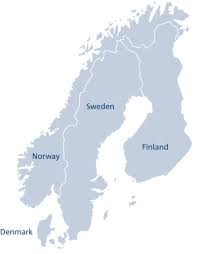Nordic
英 [ˈnɔː.dɪk]
美 [ˈnɔːr.dɪk]
- adj. 北欧人的;斯堪的纳维亚的;日耳曼民族的
- n. 北欧人;日耳曼民族;斯堪的纳维亚人;具有北欧日尔曼民族外貌特征的人
使用频率:

记忆方法
将“Nordic”与“Nord”联系记忆,"Nord"是北欧或北部的意思,而“ic”是形容词后缀,意味着属于或像……的。因此,“Nordic”可以理解为“北部的”或“北欧的”。通过这种构词法联想,可以帮助记住这个单词的意思。
以上内容由AI生成, 仅供参考和借鉴
中文词源
Nordic 北欧国家的
词源同north,北方。
英语词源
- Nordic (adj.)
- 1898, from French nordique (in J. Deniker's system of race classifications), literally "of or pertaining to the north," from nord "north" (a loan-word from Old English; see north). Perhaps influenced by German Nordisch. As a noun, from 1901. Strictly, the blond peoples who inhabit Scandinavia and the north of Britain. As a type of skiing competition, it is attested from 1954.
权威例句
- 1. The Roman Empire was overrun by Nordic barbarians.
- 罗马帝国被日耳曼的野蛮人推翻了。
- 2. He was a handsome blond Nordic type.
- 他属于北欧人那种类型,英俊潇洒,金发碧眼。
- 3. Chip nRF 903 made by Nordic corporation is used as RF wireless transceiver.
- 该卡与计算机具有RS-232 和USB两种接口方式,RF无线收发电路采用Nordic公司的nRF903芯片设计.
- 4. Tracing water masses with 129 I in the western Nordic Seas in early spring 2002.
- 2002年早春在Nordic海西边用129I跟踪水质.
- 5. The Finnish organization was very different from that of its counterparts in the rest of the Nordic region.
- 芬兰的这一机构和北欧其他国家的同类机构迥然不同。